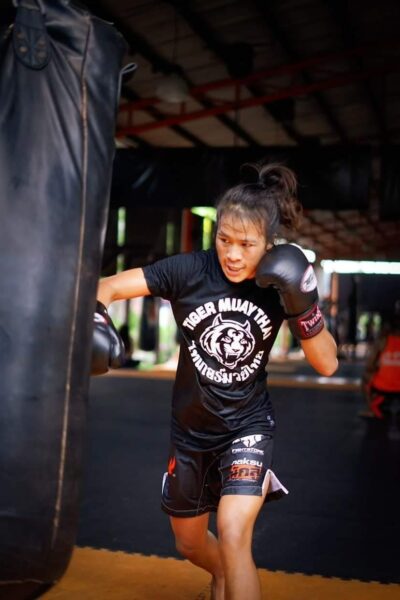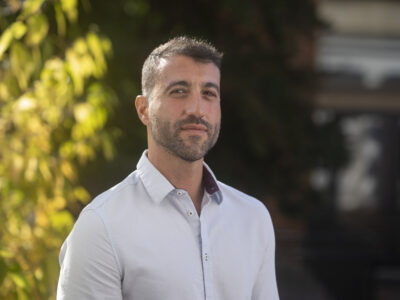Este artículo se publicó originalmente en The Irrawaddy, sitio web de noticias independiente de Myanmar. Esta versión editada se reproduce en Global Voices como parte de un acuerdo para compartir contenido.
Vero Nika, 26 años, es la primera luchadora de lethwei de Myanmar en ganar un cinturón del deporte, cuando venció a la luchadora brasileña con 25 victorias en un torneo de muay thai en Bangkok. Así se aseguró su primer lugar, según la Organización Mundial de Muay Thai.
La boxeadora, de etnia padaung, ganó la medalla de bronce para Myanmar en los Juegos del Sudeste Asiático en Singapur en 2015.
Luego del golpe de febrero de 2021, se fue a Tailandia, donde empezó a competir en muay thai en la categoría peso gallo 53 kg.
Este fenómeno de la lucha conversó recientemente con The Irrawaddy sobre victoria, derrota, sus planes y el golpe militar.
The Irrawaddy (TI): Cuéntanos de tus peleas.
Vero Nika (VN): I have fought eight Muay Thai bouts. I lost the first and won the rest. I still have two bouts to fight this year on November 20 and December 24. One is against a Thai fighter.
I have been only able to rest for five days after each bout because there is usually a match every month. Before I could rest for two to three months. If I win in November, I will fight in December without a break.
Vero Nika (VN): He tenido ocho peleas de muay thai. Perdí la primera y gané las demás. Aún tengo dos peleas más este año, el 20 de noviembre y el 24 de diciembre. Una es contra una luchadora tailandesa.
Solamente he podido descansar cinco días después de cada pelea porque generalmente hay una pelea cada mes. Antes podía descansar dos o tres meses. Si gano en noviembre, pelearé en diciembre sin hacer una pausa.
TI: ¿Qué dificultades has tenido cuando empezaste a competir en muay thai?
VN: It is easier for me now. Previously, I could not follow the style. But things are easier now.
In boxing, you can only use your fists. But in Muay Thai you can also use your elbows. I didn’t have much confidence when I boxed, perhaps because I had little experience. But I have no fear in Muay Thai. I fight to win.
VN: Ahora me es más fácil. Antes, no podía seguir el estilo, pero ahora las cosas son más fáciles.
En el boxeo, solamente puedes usar los puños. Pero en muay thai también puedes usar los codos. No tenía mucha confianza cuando boxeaba, tal vez porque tenía poca experiencia. Pero no tengo miedo en el muay thai. Lucho para ganar.
TI: Supimos que estás viviendo en Tailandia y que has participado en protestas contra la junta. ¿Qué dificultades tuviste al venir en Tailandia?
VN: After the coup, I was widely named as an opposition figure. Some said I was in the forests with the revolutionaries but I was in Yangon.
There were a lot of lies about me so I didn’t feel safe. A friend asked what I wanted to do.
I wanted to continue doing lethwei but it was not safe for me in Myanmar to continue my boxing career. So I decided to leave. It was around October last year.
VN: Después del golpe, me calificaron ampliamente como figura opositora. Algunos dijeron que estaba en el bosque con los revolucionarios pero estaba en Rangún.
Hubo muchas mentiras sobre mí, y no me sentía segura. Un amigo me preguntó qué quería hacer.
Quería continuar con el lethwei pero no era seguro para mí seguir mi carrera de boxeo en Myanmar. Así que decidí irme. Fue en octubre de 2021.
TI: ¿Cómo es Tailandia?
VN: It depends on how I view it. I don’t have my own money. I left with only the clothes on my back. I had nothing. My friend helped me with everything. Things were a little difficult when I arrived but it is better now.
VN: Depende de cómo lo veas. No tengo dinero propio. Salí solamente con la ropa que tenía puesta. No tenía nada. Mi amigo me ayudó con todo. Las cosas eran un poquito difíciles cuando llegué, pero ya están mejor.
TI: ¿Cuál es tu opinión de la junta?
VN: I hate the dictatorship. I already suffered from it when I was young. I was frightened and would hide in my house and cover my ears if I heard people speaking Burmese.
My village was not far from a military base. Soldiers came and took what they wanted.
They killed and ate our chickens. There were many rape cases back then.
I don’t want to relive those memories. I don’t want to live in fear anymore. Back then we could not afford to go to school and there were heavy taxes. I don’t want to see them again. I don’t like it.
VN: Detesto la dictadura. Ya me hizo sufrir cuando era chica. Me asustaba y me escondía en mi casa y me tapaba los oídos cuando oía que la gente hablaba birmano.
Mi aldea no está lejos de una base militar. Los soldados entraban y se llevaban lo que querían.
Mataban y se comían nuestros pollos. Hubo muchos casos de violación en esos tiempos.
No quiero revivir esos recuerdos. Ya no quiero vivir en miedo. En ese tiempo, no podíamos pagar la escuela y había impuestos altos. No quiero verlos de nuevo, no me gusta.
TI: ¿Cómo está tu familia en Myanmar?
VN: They flee into the hills when there is fighting and return home when it stops.
Civilians across the country, including in Karen State, are being killed by the regime.
I didn’t think things would go this wrong after the coup. I couldn’t help crying whenever I see reports of killings. And I could do nothing else except feel sorry for them. I want to defeat the dictatorship and support those fighting it. But I can do nothing.
VN: Huyeron a las colinas cuando había lucha y regresaban a casa cuando paraba.
A los civiles en el país, incluido el estado Karen, los está matando el régimen.
No pensé que las cosas saldrían mal después del golpe. No podía evitar llorar cada vez que veía noticias de muertes. Y no podía hacer nada más que sentir lástima por ellos. Quiero derrotar a la dictadura y apoyar a quienes la combaten. Pero no puedo hacer nada.

Vero Nika practica con la bolsa. Foto de The Irrawaddy
TI: ¿Cómo empezaste con el lethwei?
VN: I started when I was young. At school in Pekon, I enrolled in a boxing class.
I am not interested in anything except this sport. I can devote all my life to becoming a champion. I left my family and loved ones for this sport. I am obsessed with it and it is my absolute necessity.
TI: ¿Qué dificultades has enfrentado como mujer en un deporte de combate? ¿Cómo las superaste?
VN: It was not particularly tough. I like hard work. I don’t like it when I get injured in training.
But the main problem is menstruation. It is really irritating. I can’t train during my period and it hurts a lot. Several fights have coincided with my period. I have to take care of myself a lot.
I want to win the fight in December and become the black belt champion. Then I want to join the One Championship [a Singapore-based mixed-martial arts competition] next year. This is what I want the most.
VN: No fie particularmente duro. Me gusta trabajar duro. No me gusta salir lastimada de los entrenamientos.
Pero el principal problema es la menstruación. Es de verdad irritante. No puedo entrenar durante mi periodo y tengo mucho dolor. Varias peleas han coincidido con mi periodo. Debo cuidarme mucho.
Quiero ganar la pelea en diciembre y ser la primera campeona de cinturón negro. Luego quiero unirme a Campeonato Uno [competencia de artes marciales mixtos de Singapur] en 2023. Es lo que más quiero.
TI: La gente te apoya pese a tus serias dificultades. ¿Qué quieres decirles?
VN: I respect every supporter. I learned that they were watching my fights despite internet restrictions. I urge them to take care of themselves and stay safe. I will try my best and please continue to support me.
VN: Respeto a quienes me apoyan. Supe que estaban viendo mis peleas a pesar de las restricciones de internet. Los insto a cuidarse y a estar a salvo. Haré mi mejor esfuerzo. Por favor, sigan apoyándome.








